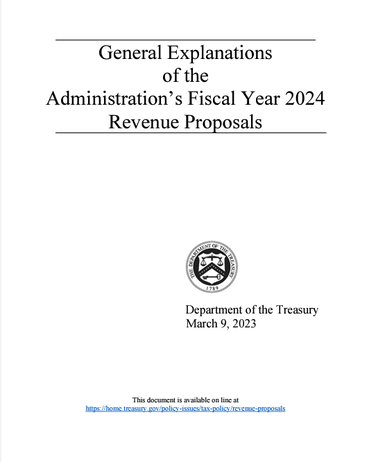 Green Book for 2024 (March 9, 2023) Green Book for 2024 (March 9, 2023) On March 9, 2023, the Biden administration offered budgetary proposals that could, if enacted, affect estate planning, particularly for high-income taxpayers, the administration of post-mortem trusts and decedent’s estates and the tax rules for trusts. These proposals are found in the Administration’s Green Book, which is an annual exercise explaining the administration’s budget for the next fiscal year. This discussion of the proposals affecting estate planning will be divided int a series of three articles, and this first article will address the proposals that target
The second and third articles will address the address the administration of post-mortem trusts and decedent’s estates and then the proposed changes to the tax rules governing trusts. Targeting High-Income Taxpayers’ Retirement Account Retirement Security vs. Wealth Transfer ToolBecause of the special tax treatment afforded retirement accounts, some high-income taxpayers use these accounts - not for retirement security – but as wealth transfer tools. An individual is in the high-income category if their modified adjusted gross income is over $450,000 if married filing jointly, over $425,000 if head-of-household, or over $400,000 in other cases. In 2021, eighty-seven percent (87%) of taxpayers, sixty-years-old or older, had some type of retirement savings. These retirement accounts are consistent with the law’s purpose that retirement accounts such as IRAs, 401Ks and Roth IRAs serve to provide retirement security. However, as of 2022, the Joint Committee on Taxation estimates
The wealth transfer occurs when the taxpayer dies. The taxpayer’s heirs will inherit the accumulated assets, which grew tax free, without having to pay any income taxes being owed if the heirs follow the rules. (While not subject to income taxes, these inherited assets will still be included in the calculation of estate taxes.) Special Distribution Rules for Large Account Balances ($10 Million or More) To curb the excessive accumulation, a high-income taxpayer with an aggregate vested account balance in a Roth retirement account exceeding $10 million would be required to distribute a minimum of 50 percent of the amount exceeding $10 million. If the high-income taxpayer balance exceeds $20 million, then the taxpayer would be subject to minimum distribution amount (“floor”). This floor amount would either be set by
Elimination of Backdoor Roth IRAA backdoor Roth conversion is a strategy used by high-income earners who are prohibited from contributing to a Roth IRA because their income is above certain limits. Instead of contributing directly to a Roth, these high-income taxpayers contribute to a traditional IRA (which has no income limits), and then convert it to a Roth IRA. Under the proposal backdoor Roth conversion would still be permitted for taxpayers with income above the Roth IRA contribution limit, but below the high-income earner limit. Final ThoughtsWhile these are just proposals, if they became law the proposals as currently drafted would affect only the "fortunate few." Nevertheless, these proposals could become a trend that ultimately will touch ordinary people like us, our loved ones and our futures.
Comments are closed.
|
Archives
April 2024
|
Services |
Company |
|

 RSS Feed
RSS Feed